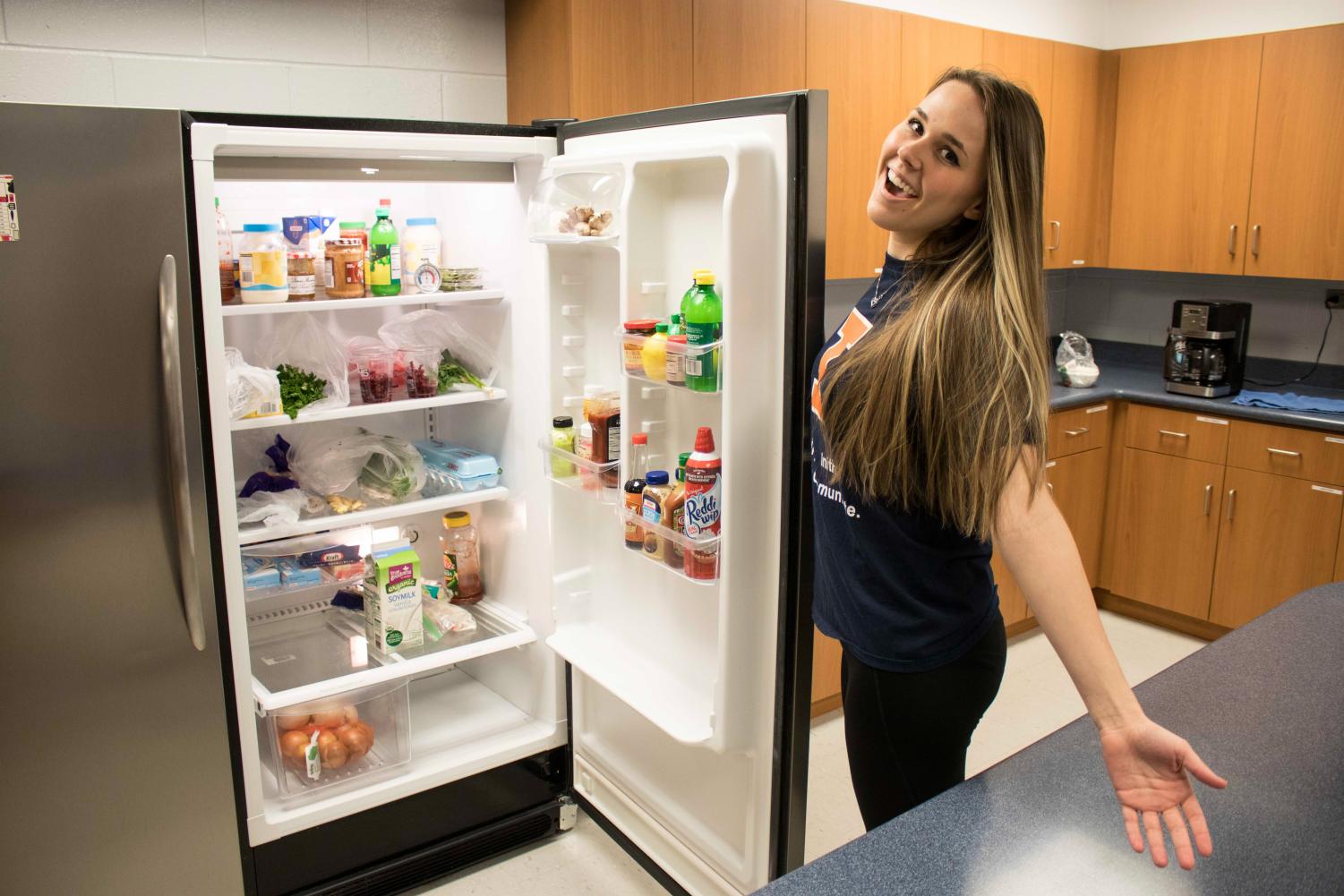
Samantha Gerry stands in the Instructional Kitchen at the ARC where sessions are held to help students gain a healthier lifestyle.
ana Harris, Campus Recreation is revamping the way college students understand nutrition.
Harris has been working as the assistant director of student wellness for a year. When she arrived on campus, she discovered the nutrition consultations offered to students and other members of the community. This program offered basic advice that Harris felt could become more tailored to the individual. She decided to expand it into a personal nutritional coaching service.
“People get stuck sometimes on the World Health Organization definition of health being the absence of disease,” Harris said. “And really we want to talk to students about health way before it gets to the point that they’re trying to manage (a) disease.”
She first turned to the registered dietitians working at McKinley. Together, they created a program that allowed students to become peer nutrition coaches. It was designed as a resource to aid individuals looking to achieve specific health and fitness goals.
One of Harris’ main collaborators was April Winslow, a registered dietitian and a doctoral student. She is currently working as a graduate assistant for the community health coordinator at the McKinley Health Center under the division of health education.
In this program, Winslow trains the nutrition coaches and supervises their sessions to provide any additional help they may require.
“Nutrition coaching is very much of a science and evidence-based structure to where it’s encouraging and reflecting and also providing information to the students and to the community about how to improve their nutrition,” Winslow said.
Individuals can register to meet with a coach online. Each meeting is around 40 minutes long and costs $5.
In a meeting, the nutrition coach will walk the individual through a 24-hour recall of everything that person ate in the last day. It then becomes a collaboration between the individual and the coach.
Individuals will then explain their hopes for nutrition development. They may also share belief systems about food, accessibility to different resources and other factors that may affect their nutrition. The coaches will give information and advice regarding how best to achieve these goals. The two will work together to establish a personalized plan of action so the individual can leave the meeting with a concrete list of objectives and methods for attaining all of them.
Besides being a valuable resource for students on campus and other members of the community, this program also provides student coaches with the opportunity to work under the supervision of a registered dietitian and practice their skills as nutritionists.
One coach is Samantha Gerry, senior in ACES. Gerry is majoring in human nutrition with a concentration in dietetics and hopes to pursue a career as a registered dietitian. After working as a cooking instructor last year, she was asked to become the program assistant in the ARC kitchen.
She values her experience learning how to conduct a motivational, empathetic and supportive interview with those who come for coaching sessions.
“Let them feel like they have, like, they’re in control and let them feel like they have reachable goals,” Gerry said. “Being able to talk to people, make them feel good about themselves and make them feel like they’re making improvements — or even if they’re not, making them feel okay with trying again — is a huge part of being a dietitian.”
The average college student can vary greatly as far as how conscientious they are when it comes to basic nutrition.
In Harris’s experiences, many students are young and healthy now, which causes them to take their fitness and nutrition for granted.
Winslow takes it a step further. She believes many students are aware of the different facets of nutrition and health. However, she is bemused by the contrast between the University’s reputation as a prestigious, well-ranked institution and the disregard for personal health in its students.
“The practices of self-care related to food (are) not as much of a priority amongst the people that are the brightest and most brilliant minds,” Winslow said. “I don’t think a lot of people have realized or have experienced how much more efficiently you can think and work and be if you’re well nourished.”
Gerry has a slightly different take on the situation. She explained that this generation may be very motivated and health conscious, but they struggle to find the right resources to live the life they want. Some live in dorms with limited dining hall options while others live in apartments without a great deal of access to healthy foods.
This program is designed to find a way to meet anyone’s health needs. Harris hopes it will be able to help students get the most of their experience at the University.
“We want to make sure that we’re sending the message that there are all these positive things that they can do for their health, their well-being, their wellness,” Harris said. “There are a number of different services that we offer that can help students get the most out of their time here and have a really great time while they’re doing it.”
[“Source-dailyillini”]










